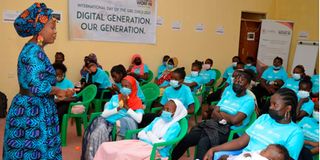Breaking News: Old Kijabe dam tragedy: Death toll rises to 45
Give girl-child her rights

Gospel singer Mimah Shafie gives tips to girls and young women on how to use social media platforms to change their lives at Young African Women Initiative (YAWI) centre in Nakuru town on October 10, 2021 during an event to commemorate the International Day of the Girl Child.
Monday was the International Day of the Girl-Child, focusing on promoting girls’ empowerment and highlighting their unique challenges.
This year’s theme, “My voice, our equal future”, reimagines a better world inspired and led by adolescent as part of global gender equality. This is by raising awareness on issues affecting the girl-child. Many of the girl issues are visible but people tend to ignore their suffering.
The day focuses on the need to address girls’ challenges and to promote their empowerment and fulfilment of their human rights. The environment has not been safe for girls and it has been extremely problematic when it comes to gender equality, access to sanitary towels, good education, zero discrimination and ending teenage pregnancy.
Meaningfully involving girls and participation in forums, ending all forms of discrimination against women and girls is not only a basic human right but also accelerating sustainable development.
Adolescent girls have the right to a safe, educated and healthy life. Sadly, many of them are vulnerable and often sleep around to get money for sanitary towels. Most girls in Kenya are suffering the effects of child domestic labour.
Poverty
Some of the girls are driven into this situation by poverty some at a very young age. That is where some of them are sexually abused.
When women are denied access to income-generating processes, children are affected. Early marriage and female genital mutilation (FGM) are still rampant in some communities.
Adequate funds should be set aside to ensure training of the local administrators while teachers should monitor and report the incidence to authorities, sensitising the communities involved, as well as giving severe penalties to those involved.
Law enforcement officers should work with community leaders to end FGM and child marriages. Rehabilitation centres should be set aside to ensure girls get adequate counselling and go back to school.





